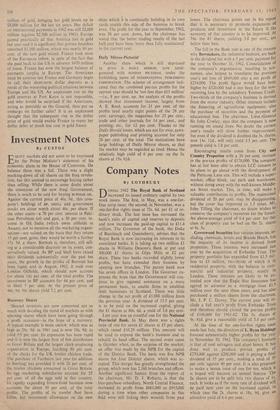Investment Notes
By CUSTOS
EQUITY markets did not seem to be impressed by the Prime Minister's statement of his economic plans in the House of Commons. On balance there was a fall. There was a slight marking-down of oil shares on the Iraq revolu- tion, but this seemed to encourage buying rather than selling. While there is some doubt about the intentions of the new Iraqi Government, there is much to be said for buying BURMAH OIL. Against the current price of 46s. 9d., this com- pany's holdings of BP, SHELL and government stocks are alone worth about 46s. per share. If the other assets-a 70 per cent. interest in Paki- stan Petroleum (oil and gas), a 50 per cent. in- terest in Oil India (which owns oilfields in Assam), not to mention all the marketing organi- sations-are valued on the basis that they return 15 per cent. gross, they would be worth a further 17s. 3d. a share. Burmah is, therefore, still sell- ing at a considerable discount on its assets, con- servatively valued. As BP and Shell have raised their dividends substantially over the past ten years. the growth in the profits of Burmah has been rapid, and in August, 1962, it took over Lobitos Oilfields, which should now account for about 144 per cent. of the total profits. The investment in BP accounts for 44 per cent. and in Shell 7 per cent. At the present price of 46s. 9d. the shares yield 7.2 per cent.
Recovery Shares Shrewd investors are now concerned not so much with deciding the trend of markets as with selecting shares which have been going through a profit recession-in the hope of a recovery. A typical example is ROSS GROUP, which was as high as 29s. 9d. in 1961 and is now 18s. 9d. to yield 5.9 per cent. Its expansion has been rapid and it is now the largest firm of fish distributors in Great Britain and the largest chick-producing organisation in Europe, hatching 80 per cent. of the chicks for the. UK broiler chicken trade. The purchase of Fairbairn last year (in addition to Sterling) has provided it with 20 per cent. of the broiler chickens consumed in Great Britain. Its egg marketing subsidiaries account for 25 per cent. of all the eggs sold in this country. Its rapidly expanding frozen-food business now accounts for about 30 per cent. of the total profits. The profits of its trawler fleet have fallen, but investment allowances on the new i ships which it is continually building in its own yards enable this side of the business to break even. The profit for the year to September, 1962, was 30 per cent. down, but the chairman has stated that the better trading results of the last half-year have been 'more than fully maintained' in the current year.
Daily Mirror-Pictorial
Another share which is still depressed in price is DAILY MIRROR, now amal- gamated with SUNDAY PICTORIAL under the forbidding name of INTERNATIONAL PUBLISHING CORPORATION. The scheme of arrangement indi- cated that the combined pre-tax profits for the current year should be 'not less than £13 million' -i.e., 8 per cent. up. An analysis of the profits showed that investment income, largely from A. E. Reed, accounts for 21 per cent. of the profits (and nearly eight points of the 28 per cent. earnings), the magazines for 25 per cent., trade and other journals for 14 per cent., and printing, etc., for 12 per cent. Thanks to the Daily Herald losses, which are not for ever, news- paper publishing and printing account for only 28 per cent. of the total. The institutions have large holdings of Daily Mirror shares, so that the market may be regarded as tired. Hence the relatively high yield of 6 per cent. on the 5s. shares at 15s. Old.


































 Previous page
Previous page